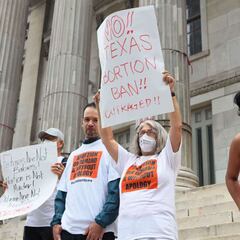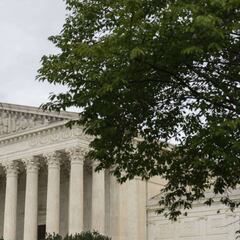What states other than Texas have a 6-week abortion ban?
The US Supreme Court in a 5-4 decision decided to deny an emergency appeal to a new Texas law effectively banning abortions at 6 weeks. Texas is not alone.

Since the landmark 1973 decision of the Supreme Court in the case of Roe v. Wade abortion has been legal in the US free from excessive government restriction up until fetal viability. It also began a decades-long concerted effort by anti-abortion activists to overturn the high court’s ruling through ever more restrictive laws.
The Supreme Court has over ensuing decades heard numerous cases challenging those laws attempting to create hurdles to the exercise the right to abortion or even ban it outright. The court has consistently upheld the right but a recent 5-4 ruling denied an emergency appeal allowing the first of these laws to take effect. Abortion is now illegal in Texas after cardiac activity is detectable, normally by week six of pregnancy. Other states have put similar laws on the books, which ones?
Also see:
- How will Texas' new abortion law impact access and the cost of an abortion?
- Biden promises to “protect and defend” abortion rights against Texas ban
- Texas passes a spate of controversial new laws
- Supreme Court upholds new Texas abortion law
States that ban abortion at week 6 or earlier
There are nine states that have passed legislation that would essentially ban abortion by the sixth week of pregnancy, referred to by anti-abortion proponents as “heartbeat” and sometimes “fetal heartbeat” legislation. Around week six of a pregnancy a heartbeat typically occurs, but neither “fetal” nor “heartbeat” are appropriate terms.
The president of the American College of Obstetricians and Gynecologists (ACOG) Dr Ted Anderson said “What is interpreted as a heartbeat in these bills is actually electrically induced flickering of a portion of the fetal tissue that will become the heart as the embryo develops.” The ACOG has come out against this type of legislation telling the Guardian it’s misleading and the “arbitrary” bans are not reflective of fetal development or science.
At six weeks into pregnancy the majority of women are not even aware that they are pregnant. A study from the University of Texas found that the strict new restrictions would prevent around 85% of women from receiving access to abortion care.
Under the cover of darkness, by choosing to do nothing, the Supreme Court allowed an unconstitutional abortion ban in Texas to go into effect last night.
— Hillary Clinton (@HillaryClinton) September 1, 2021
Their decision doesn’t change the fact that reproductive rights are human rights. We'll fight for them.https://t.co/hp1N6G2S3M
According to the Guttmacher Institute, a pro-choice research organization, the states that have banned abortion at six weeks include; Georgia, Iowa, Kentucky, Mississippi, North Dakota, Ohio, South Carolina, Tennessee and Texas. The Texas law is the only one that is currently in effect while the others are being litigated. The South Carolina law is the only one that makes exceptions in instances of rape or incest.
There are four states that have laws banning abortion at conception; Alabama, Arkansas, Louisiana and Utah. The courts have stopped the laws from going into effect.
States have "trigger laws" that would ban abortion if Roe v. Wade were overturned
The end goal of anti-abortion activists and lawmakers writing up legislation to ban abortion in the US is overturning Roe v. Wade. Chief Justice John G. Roberts Jr during his confirmation hearing called the landmark 1973 abortion rights case "settled as a precedent of the court." However, the ruling will meet yet another challenge when the high court considers a restrictive abortion law from Mississippi this fall.
Twelve states have passed “trigger laws” — abortion bans that would take if Roe v. Wade were appealed.
— The Lily (@thelilynews) September 3, 2021
Fourteen states and the District of Columbia have policies that explicitly protect the right to abortion.https://t.co/hivqmWuqxV
Related stories
Laws similar to the Mississippi one have been struck down by the court before, but the composition of the Supreme Court shifted during the Trump presidency. The former President through controversial means was able to appoint three Justices who are hostile to abortion rights.
If Roe v. Wade were to be overturned there are 17 states that have “trigger laws” that could prohibit abortion in those states. They include; Alabama, Arkansas, Arizona, Idaho, Kentucky, Louisiana, Michigan, Mississippi, North Dakota, Oklahoma, South Dakota, Tennessee, Texas, Utah, West Virginia and Wisconsin.


